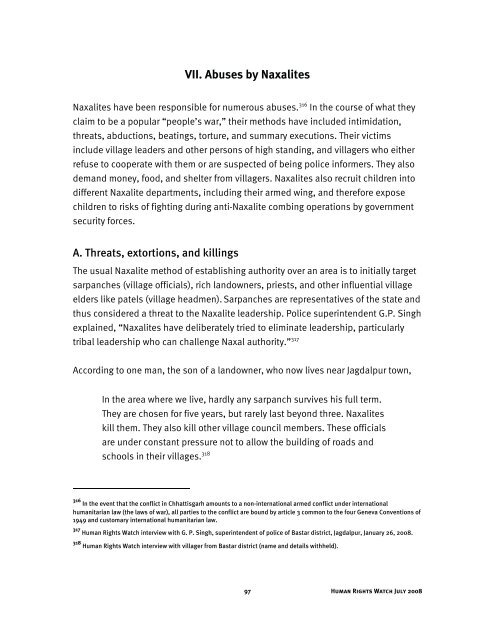âBeing Neutral is Our Biggest Crimeâ - Global Coalition to Protect ...
âBeing Neutral is Our Biggest Crimeâ - Global Coalition to Protect ...
âBeing Neutral is Our Biggest Crimeâ - Global Coalition to Protect ...
You also want an ePaper? Increase the reach of your titles
YUMPU automatically turns print PDFs into web optimized ePapers that Google loves.
VII. Abuses by Naxalites<br />
Naxalites have been responsible for numerous abuses. 316 In the course of what they<br />
claim <strong>to</strong> be a popular “people’s war,” their methods have included intimidation,<br />
threats, abductions, beatings, <strong>to</strong>rture, and summary executions. Their victims<br />
include village leaders and other persons of high standing, and villagers who either<br />
refuse <strong>to</strong> cooperate with them or are suspected of being police informers. They also<br />
demand money, food, and shelter from villagers. Naxalites also recruit children in<strong>to</strong><br />
different Naxalite departments, including their armed wing, and therefore expose<br />
children <strong>to</strong> r<strong>is</strong>ks of fighting during anti-Naxalite combing operations by government<br />
security forces.<br />
A. Threats, ex<strong>to</strong>rtions, and killings<br />
The usual Naxalite method of establ<strong>is</strong>hing authority over an area <strong>is</strong> <strong>to</strong> initially target<br />
sarpanches (village officials), rich landowners, priests, and other influential village<br />
elders like patels (village headmen). Sarpanches are representatives of the state and<br />
thus considered a threat <strong>to</strong> the Naxalite leadership. Police superintendent G.P. Singh<br />
explained, “Naxalites have deliberately tried <strong>to</strong> eliminate leadership, particularly<br />
tribal leadership who can challenge Naxal authority.” 317<br />
According <strong>to</strong> one man, the son of a landowner, who now lives near Jagdalpur <strong>to</strong>wn,<br />
In the area where we live, hardly any sarpanch survives h<strong>is</strong> full term.<br />
They are chosen for five years, but rarely last beyond three. Naxalites<br />
kill them. They also kill other village council members. These officials<br />
are under constant pressure not <strong>to</strong> allow the building of roads and<br />
schools in their villages. 318<br />
316 In the event that the conflict in Chhatt<strong>is</strong>garh amounts <strong>to</strong> a non-international armed conflict under international<br />
humanitarian law (the laws of war), all parties <strong>to</strong> the conflict are bound by article 3 common <strong>to</strong> the four Geneva Conventions of<br />
1949 and cus<strong>to</strong>mary international humanitarian law.<br />
317 Human Rights Watch interview with G. P. Singh, superintendent of police of Bastar d<strong>is</strong>trict, Jagdalpur, January 26, 2008.<br />
318 Human Rights Watch interview with villager from Bastar d<strong>is</strong>trict (name and details withheld).<br />
97<br />
Human Rights Watch July 2008
















